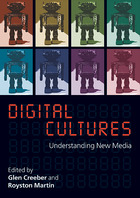Christian Fuchs: Internet and Society. Social Theory in the Information Age (2007)
Filed under book | Tags: · collaboration, facebook, gift economy, information technology, internet, mass media, myspace, neoliberalism, politics, technology, virtual communities, youtube

In this study, Christian Fuchs discusses how the internet has transformed the lives of human beings and social relationships in contemporary society. By outlining a social theory of the internet and the information society, he demonstrates how the ecological, economic, political, and cultural systems of contemporary society have been transformed by new ICTs. Fuchs highlights how new forms of cooperation and competition are advanced and supported by the internet in subsystems of society and also discusses opportunities and risks of the information society.
Publisher Routledge, 2007
ISBN 0415961327, 9780415961325
398 pages
Glen Creeber, Royston Martin (eds.): Digital Cultures: Understanding New Media (2008)
Filed under book | Tags: · digital cinema, digital divide, facebook, internet, mass media, media studies 2.0, new media, public broadcasting, public sphere, video games, wikipedia, youtube

From Facebook to the iPhone, from YouTube to Wikipedia, from Grand Theft Auto to Second Life – this book explores new media?s most important issues and debates in an accessible and engaging text for newcomers to the field.
With technological change continuing to unfold at an incredible rate, Digital Cultures rounds-up major events in the media?s recent past to help develop a clear understanding of the theoretical and practical debates that surround this emerging discipline. It addresses issues such as:
* What is new media?
* How is new media changing our lives?
* Is new media having a positive or negative effect on culture and human communication?
Each chapter contains case studies which provide an interesting and lively balance between the well-trodden and the newly emerging themes in the field.
Topics covered include digital television, digital cinema, gaming, digital democracy, mobile phones, the World Wide Web, digital news, online social networking, music and multimedia, virtual communities and the digital divide.
Digital Cultures is an essential introductory guide for all media and communication studies students, as well as those with a general interest in new media and its impact on the world around us.
Publisher Open University Press, 2008
ISBN 0335221971, 9780335221974
Length 205 pages
Kazys Varnelis (ed.): Networked Publics (2008)
Filed under book | Tags: · blogging, capitalism, filesharing, information economy, internet, internet of things, locative media, mass media, media ecology, network culture, network society, networks, p2p, rfid, viral marketing, web 2.0, youtube

Digital media and network technologies are now part of everyday life. The Internet has become the backbone of communication, commerce, and media; the ubiquitous mobile phone connects us with others as it removes us from any stable sense of location. Networked Publics examines the ways that the social and cultural shifts created by these technologies have transformed our relationships to (and definitions of) place, culture, politics, and infrastructure.
Four chapters—each by an interdisciplinary team of scholars using collaborative software—provide a synoptic overview along with illustrative case studies. The chapter on place describes how digital networks enable us to be present in physical and networked places simultaneously (on the phone while on the road; on the Web while at a café)—often at the expense of non-digital commitments. The chapter on culture explores the growth of amateur-produced and -remixed content online and the impact of these practices on the music, anime, advertising, and news industries. The chapter on politics examines the new networked modes of bottom-up political expression and mobilization, and the difficulty in channeling online political discourse into productive political deliberation. And finally, the chapter on infrastructure notes the tension between openness and control in the flow of information, as seen in the current controversy over net neutrality. An introduction by anthropologist Mizuko Ito and a conclusion by architecture theorist Kazys Varnelis frame the chapters, giving overviews of the radical nature of these transformations.
Contributors: Walter Baer, François Bar, Anne Friedberg, Shahram Ghandeharizadeh, Mizuko Ito, Mark E. Kann, Merlyna Lim, Fernando Ordonez, Todd Richmond, Adrienne Russell, Marc Tuters, Kazys Varnelis.
Publisher MIT Press, 2008
ISBN 0262220857, 9780262220859
176 pages
author (includes a research blog and lecture videos)
publisher
google books
PDF (updated on 2012-8-7)
Comment (0)
